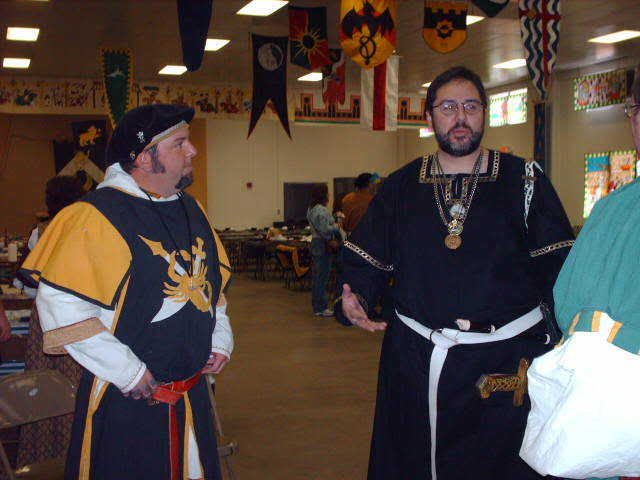| This is about understanding the principle behind formal address, instead of trying to go by a rule. When Artan VI was king, I was steward of the household and his squire Dermod asked me by e-mail to clarify something. Here's our exchange from October, 2006. Dermod came up with a great phrase, as you'll see: |
Dermod
If I recall, you said it's "Your Majesty" once in the morning and "Your Grace" or "Sire" or "Madam" for the rest of the day. Is this correct? Also, I like "My Lord Duke", is this accectable? Is there an alternative to "Madam"? Am I over thinking this?Ælflæd
You're over-calcifying it.DermodHow do you stand on a skateboard or a surfboard?
I understand. thank you, Dermod.Ælflæd
-=-I understand. thank you, Dermod.-=-DermodThat's all I get? That's all the conversation I get!?-=-If I recall, you said it's "Your Majesty" once in the morning and "Your Grace" or "Sire" or "Madam" for the rest of the day. Is this correct?-=-It's true that I said that.-=-Also, I like "My Lord Duke", is this acceptable?-=-
If someone "does what I said" without understand what I meant, that could be awkward.If one is with the king for four hours straight and has said "Your Majesty" once, then the king is aware that proper deference was shown, and lesser references couldn't possibly be offensive. The initial contact, the handshake moment, as it were, has happened. Maybe that's what it's like, the first butt-sniff moment. You don't shake hands repeatedly during a conversation, just at the beginning and probably the end.
But if you meet again later in the same day or that evening, you might shake the man's hand again. So if you're in the presence for an hour or ten minutes, and you use a formal address up front, then you go away and have lunch at Taco Bell and buy gasoline and come back to the site and fight in a tournament, when you see the king again, that's not a "the rest of the day" situation. Maybe I should have said "for the rest of the session" or "the rest of that contact period."
After May 12, sure. (end of the reign)
I don't think it's as nice as "your Grace," and it reminds me of Link and Zelda cartoons when the princess is called "Princess."Ælflæd
ahh, the "verbal handshake", that makes sense to me. I'm trying not to take all that you say as literal, however it is a template of sorts and w/ this clarification I have a better understanding. the principle behind the rule.ÆlflædI will address him as "Sire" and her as "Madam" after the "handshake".
your servant,
Dermod
-=-ahh, the "verbal handshake", that makes sense to me. I'm trying not to take all that you say as literal, however it is a template of sorts and w/ this clarification I have a better understanding-=-Had you not asked the question, though, I wouldn't have thought of this clarification, so thank you. If you find anything else I've ever written that you think I could clarify, I would be glad to try to do so.It's not that I don't think what I'm writing is literal, it's just not a matter of "correct" or "incorrect." It's a direction to head. It's not even a perfection or an ideal. It's a good way, or a better way. A formal way, or a courteous way, or a virtuous way to act.
What I write is literal as opposed to poetic or figurative, but I'm advising and not directing. Maybe you could explain it better to any of the gentlemen on the retinue who might understand the handshake parallel, or something else you might be able to put in terms they might understand, either when you're hanging out with them at an event or out on the list, or on the side. If you know someone is confused, please feel free to jump in to clarify, on the retinue list or anywhere. If you can translate me to others, I won't mind.
Thank you for your interest in these things.
Ælflæd
end of the October 2006 exchange
 I love Dermod's phrase "the verbal handshake." It's very simple and clear.
I love Dermod's phrase "the verbal handshake." It's very simple and clear.
The photo is Lord Dermod with King Artan, at al-Barran Midwinter in 2006.
Other articles on use of titles:
Everyday Language Use for theSCA—Titles
Heralds and Heraldry—Names And Titles
Etiquette—Introductions in the Society
Etiquette—Forms of Address
Overfamiliarity from "Humility and Formality" (more of that)
Much more Ælflæd stuff
E-mail Ælflæd at [email protected]